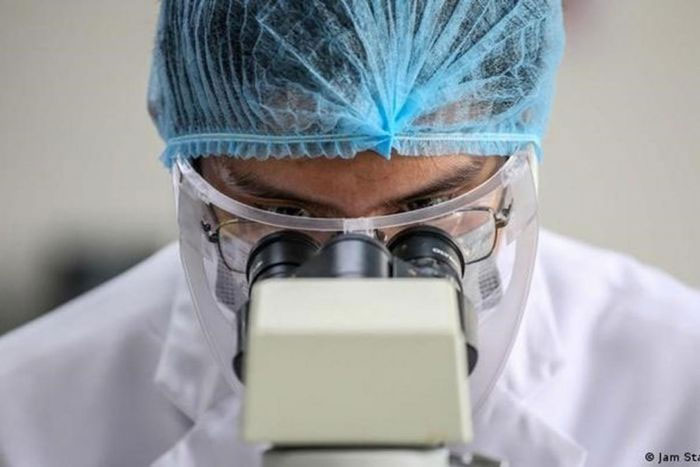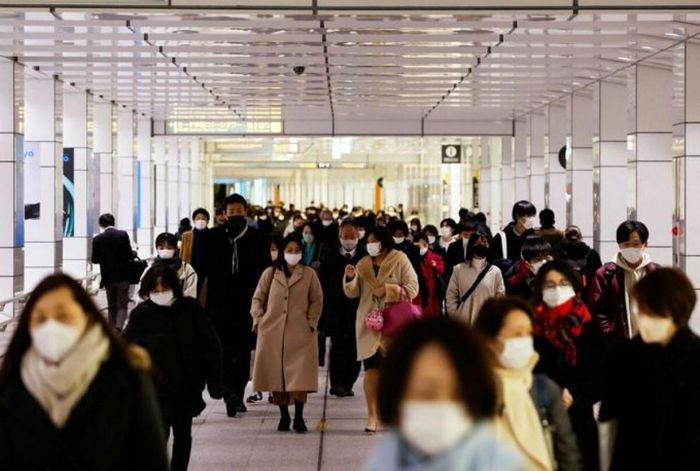Japanese expert Kei Sato warns that BA.2 should not be considered a branch of Omicron, and this variant requires closer monitoring.
A recent study indicates that BA.2 virus – a subvariant of Omicron, not only spreads faster than the original variant but also has the potential to cause more severe illness and diminish the effectiveness of some of the key “weapons” we use to combat Covid-19.

Japanese scientists discover concerning signs about the BA.2 variant. (Photo: AFP)
Concerning Findings
New laboratory studies in Japan show that BA.2 possesses characteristics that enable it to cause more severe Covid-19 symptoms than older variants, such as Delta. Like Omicron, it appears to evade immunity generated by vaccination. BA.2 also shows resistance to some treatments, including sotrovimab – a monoclonal antibody currently used against Omicron.
These findings were published on the open data science portal bioRxiv on February 16. Dr. Daniel Rhoads, head of microbiology at the Cleveland Clinic in Ohio (USA), stated: “According to the research, BA.2 seems to be a ‘worse’ virus than BA.1 due to its easier transmissibility and its ability to cause more severe illness. Dr. Rhoads reviewed the report on bioRxiv but was not involved in the research process.”
Compared to the original SARS-CoV-2 virus that caused Covid-19, which first appeared in Wuhan, China, BA.2 has more mutations. It also has dozens of genetic changes that differ from the original Omicron strain and many other variants such as Alpha, Beta, Gamma, and Delta.

People wearing masks to prevent Covid-19 in Tokyo, Japan, on February 9. (Photo: Reuters)
Expert Kei Sato from the University of Tokyo, who conducted the study, noted that these findings suggest that BA.2 should not be seen as a branch of Omicron and that this variant requires closer monitoring.
Speaking to CNN, Kei Sato said: “BA.2 is referred to as the ‘stealth Omicron’ because it is not easily detected in PCR tests. While Omicron can be detected by PCR due to the absence of the S gene, BA.2 lacks this genetic characteristic. Therefore, laboratories need to perform genetic sequencing to identify it.”
“Developing a method to detect BA.2 will be the first thing many countries need to do,” the expert emphasized.
Deborah Fuller, a virologist at the University of Washington School of Medicine, suggested: “We may need a new Greek letter,” referring to the practice of naming new variants based on the Greek alphabet. Data shows that BA.2 may spread 30 to 50% more easily than Omicron. It has been detected in 74 countries and 47 states in the USA.
Still Some Optimistic Signals
The Centers for Disease Control and Prevention (CDC) estimates that about 4% of the U.S. population has been infected with BA.2. According to the World Health Organization (WHO), BA.2 has become the dominant variant in 10 countries: Bangladesh, Brunei, China, Denmark, Guam, India, Montenegro, Nepal, Pakistan, and the Philippines.
However, there is varying evidence regarding the severity of BA.2. Hospitalization rates continue to decrease in countries where BA.2 has surged, such as South Africa and the UK. But in Denmark, where BA.2 is becoming the leading cause of Covid-19, the number of hospitalizations and deaths is rising daily, according to WHO.
Research shows that BA.2 can replicate in cells faster than BA.1 (the original version of Omicron). It also causes cells to stick together more easily, forming a large cell mass called a syncytium. This is concerning because these syncytia can become “factories” for producing more copies of the virus. Delta also has the ability to create syncytia effectively, and many believe this could be why it wreaks havoc on the lungs.
When researchers infected hamsters with BA.1 and BA.2, those infected with BA.2 exhibited more severe symptoms and poorer lung function. In tissue samples, the lungs of hamsters infected with BA.2 were more damaged compared to those infected with BA.1.
Similar to the original Omicron, BA.2 can disrupt antibodies in the blood of individuals who have been vaccinated against Covid-19. It also has the ability to evade antibodies from individuals who previously contracted Covid-19 due to infection with the Alpha and Delta variants. Alarmingly, BA.2 is nearly completely resistant to some monoclonal antibody treatments.
Nevertheless, there are some optimistic signs: Antibodies in the blood of individuals who were recently infected with Omicron may provide protection against BA.2, especially if they have been vaccinated. Expert Fuller believes that while BA.2 is more transmissible and causes more illness than BA.1, it may not lead to a more severe wave of Covid-19.
“One of the things we need to consider before studying new variants that seem more dangerous is that every story has two sides,” she said. “Our immune system is evolving, and that will push back against any threat.”
Expert Fuller noted: “We are in a race against the virus, so the important question is which side will lead? What we ultimately want to do is help the host stay ahead of the virus. In other words, help our immunity stay a step ahead of the next variant.”


















































